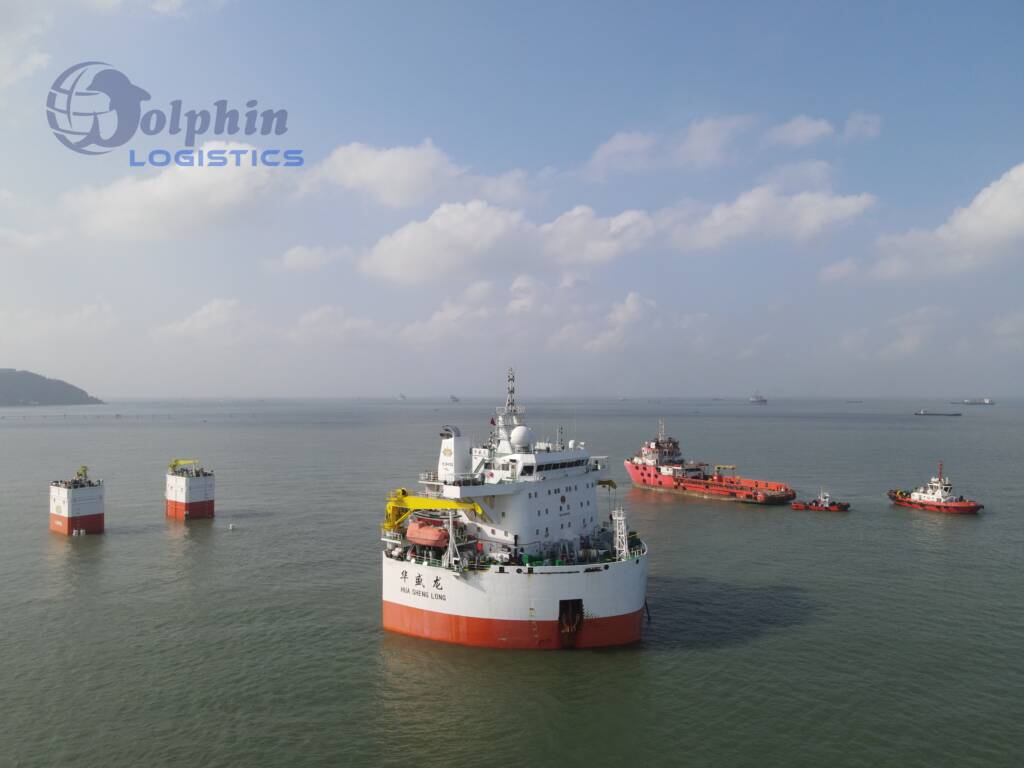In the maritime world, efficiency and safety are paramount when it comes to transporting oversized and heavy cargo. When faced with the challenge of loading and unloading these massive items onto or off a vessel, the “Float-On, Float-Off” (FLO/FLO) operation has emerged as an ingenious solution, streamlining the transportation of complex cargo while minimizing risks.

What is Float-On, Float-Off?
Float-On, Float-Off is a specialized method used in maritime logistics for handling heavy or unwieldy cargo, such as construction equipment, oil rigs, large machinery, and even entire ships. This technique involves using a vessel with specific design features that allow it to partially or fully submerge its deck, allowing cargo to be floated onto or off the ship’s deck.
The Process
- Preparation: Before the operation begins, careful planning is essential. Engineers and maritime experts analyze the cargo’s weight, dimensions, and sturdiness to ensure the vessel can handle the load safely. This planning phase also includes coordinating with the port, the ship’s crew, and specialized loading equipment.
- Submersion: The ship’s deck or a specific section of the vessel is intentionally submerged to create a floating platform. This submersion is controlled and maintained at a level suitable for cargo to be safely floated on or off the ship.
- Loading/Unloading: The cargo is then floated onto the vessel’s deck in a controlled and secure manner. This process is meticulously managed to prevent any damage to the cargo or the ship. Once the cargo is safely positioned, the ship can begin the journey, carrying its precious load to the desired destination.
- Completion: Upon reaching the destination, the vessel goes through the reverse process. The deck is again submerged to allow the cargo to be floated off the ship and onto the port or another designated area.
Benefits of Float-On, Float-Off
- Safety: FLO/FLO operations significantly reduce the risk of damage to the cargo during loading and unloading. The controlled process minimizes impacts and provides a secure environment for the cargo. This safety advantage is particularly important for valuable, sensitive, or oversized cargo that may be at greater risk using traditional methods.
- Efficiency: This method is highly efficient for transporting oversized or unusually shaped cargo that may be challenging to load using traditional methods like cranes. The streamlined process reduces the time needed for cargo handling, improving overall operational efficiency. This efficiency is especially valuable when time-sensitive deliveries or strict schedules are involved.
- Versatility: The FLO/FLO technique can handle a wide range of cargo, from heavy industrial equipment to entire ships. This versatility makes it a valuable choice for the maritime industry. The ability to accommodate diverse cargo types makes FLO/FLO a flexible solution that can be applied to various sectors, enhancing its usefulness in the logistics and transportation landscape.

Considerations and Downsides
- Higher Costs: Implementing FLO/FLO operations can be more expensive than traditional cargo handling methods. The need for specialized vessels, equipment, safety measures, and skilled personnel contributes to increased overall transportation costs.
- Infrastructure Limitations: Not all ports and destinations are able to handle FLO/FLO operations. Adequate facilities, water depths, and specialized infrastructure are necessary for a successful FLO/FLO process.
- Weather Dependence: FLO/FLO operations are highly dependent on weather conditions. Adverse weather, such as strong waves, high winds, or turbulent seas, can disrupt the loading or unloading process. The unpredictable nature of weather can lead to delays and safety concerns.
Despite these downsides, FLO/FLO remains a valuable technique for handling specific types of cargo, especially when the benefits outweigh the challenges. Proper planning, investment in infrastructure, and careful consideration of the unique requirements of each shipment can help mitigate these downsides and ensure successful FLO/FLO operations.
By: Linh Le – Dolphin Logistics Co., LTD.


